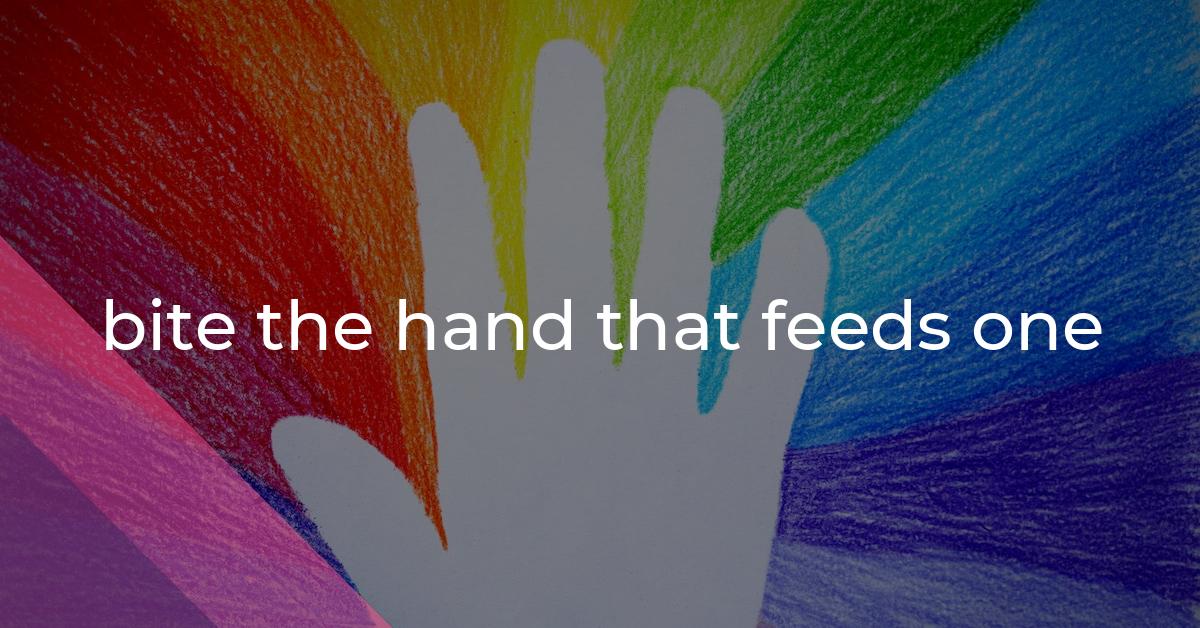bite the hand that feeds one: Idiom Meaning and Origin
What does ‘bite the hand that feeds one’ mean?
"Bite the hand that feeds one" means to harm or betray someone who supports or helps you.

Idiom Explorer
The idiom "take a bite out of" means to reduce or lessen something, usually by a significant amount.
The idiom "eye for an eye, a tooth for a tooth" means seeking revenge or punishment that is equal to the harm or injury inflicted by someone else.
The idiom "eat the rich" figuratively means to criticize or oppose the wealthy and powerful members of society in order to achieve greater economic equality.
The idiomatic expression "eat someone's lunch" means to defeat or outperform them, typically in a competitive or confrontational situation.
"Eat someone out of house and home" means to consume all of someone's food and resources, usually in large quantities. It is used to describe someone who eats voraciously and excessively, causing a significant strain on the household's supplies and finances.
The idiom "eat out of someone's hand" means to be completely under someone's control or influence, obeying their every command without question.
The idiom "eat one's own" means to act selfishly or prioritize one's own needs or interests above others, often to the detriment of others or the overall goal.
The idiom "eat one's young" means to destroy or harm the offspring or the next generation, either literally or figuratively, usually due to selfishness or lack of nurturing. It implies a lack of care or regard for the welfare of one's own children or future successors.
The idiom "cut off one's nose to spite one's face" means taking a self-destructive action to hurt someone else, but ultimately hurting oneself in the process.
Trust Turns Treachery
The idiom "bite the hand that feeds one" is a common phrase in English. It means betraying or harming someone who has been providing support or assistance. The origin of this idiom can be traced back to ancient Roman times, and it has been used in various forms throughout history.
One possible origin of the idiom is the fable of "The Dog and the Bone" attributed to Aesop. In the fable, a dog finds a juicy bone and is happily chewing on it. When it sees its reflection in a pond, it mistakes it for another dog with an even bigger bone. Greedily wanting the other bone, it opens its mouth to grab it, losing its own bone in the process. This fable serves as a cautionary tale about being ungrateful and losing what one already has.
Another possible origin of the idiom is the historical practice of feeding hunting dogs by hand. Dogs relied on their handlers for food, and biting the hand that fed them would not only harm the handler but also jeopardize the dog's own source of sustenance. This analogy to ungratefulness and self-destruction is believed to have given rise to the idiom.
The idiom "bite the hand that feeds one" gained prominence in English literature during the 17th century, appearing in works by playwright William Shakespeare, including his play "Julius Caesar." In Act 3, Scene 1, Mark Antony uses the phrase to criticize the conspirators who had killed Caesar, emphasizing their betrayal of someone who had supported and elevated them.
Since then, the idiom has become widely recognized, used in various contexts to highlight acts of betrayal or ingratitude. It is often employed to criticize individuals or groups who harm those who have provided them with support, whether it is financial, emotional, or otherwise.
In contemporary usage, the idiom is often applied to situations involving authority figures or organizations being undermined or harmed by the very people they have supported or nurtured. This can range from employees sabotaging their employers to political leaders being undermined by their own supporters.
The idiom holds significant cultural and social implications, highlighting the importance of trust, gratitude, and reciprocity in relationships. It serves as a reminder of the potential consequences of betraying those who have shown kindness and provided assistance, as well as the fragility of the bonds that hold society together.
Related idioms that convey similar sentiments include "eat out of someone's hand" and "bite someone's head off." These idioms all revolve around the theme of actions that harm or betray someone who has been providing support or assistance.
"Eat out of someone's hand" refers to a situation where someone is completely dependent on or under the control of another person. It conveys the idea of willingly submitting to someone's authority or influence, trusting them implicitly. However, when someone "bites the hand that feeds them," it means they have betrayed or harmed the very person they were dependent on.
"Bite someone's head off" is an expression used to describe a sharp or angry response to a comment or question. It implies a sudden and intense reaction, often disproportionate to the situation. Just as biting someone's head off is aggressive and harmful, biting the hand that feeds one is an act of betrayal and harm.
The idiom "bite the hand that feeds one" has a long history and has become a widely recognized metaphorical expression of betrayal and ingratitude. Whether it originates from ancient fables or historical practices, the idiom continues to be used in contemporary contexts to convey a sense of ungratefulness and self-destruction. Through its usage, it prompts us to reflect on the importance of trust, gratitude, and reciprocity in our relationships.
Example usage
Examples of how the idiom *bite the hand that feeds one* can be used in a sentence:
- She bit the hand that feeds her by criticizing her boss's decision publicly.
- The country is biting the hand that feeds it by imposing heavy taxes on foreign investors.
- He bit the hand that feeds him when he ended his partnership with his most loyal client.
The idiom "bite the hand that feeds one" is used to describe someone who harms or disrespects someone or something that provides them with support, assistance, or resources. These examples illustrate situations where individuals or entities act against their own best interests by antagonizing the source of their benefits, often resulting in negative consequences.
More "Ingratitude" idioms
We missed the mark - nothing found.



